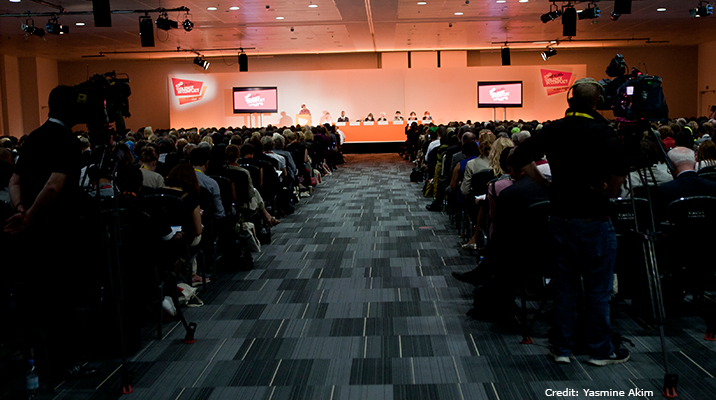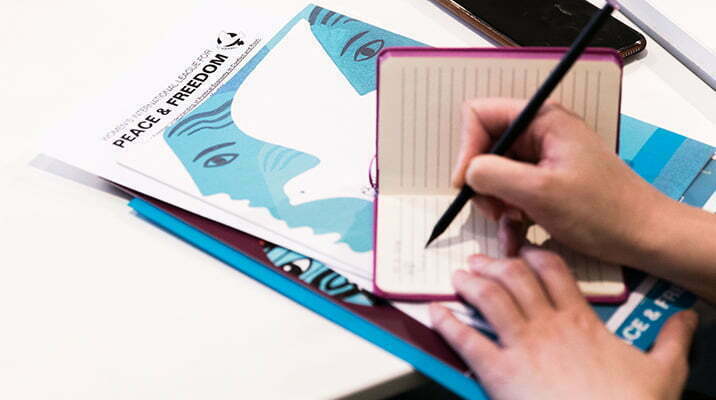The Global Summit to End Sexual Violence in Conflict in London attracted worldwide media coverage, not just because of Angelina Jolie’s attendance in her role as the UNHCR Special Envoy but also because the co-chair for the conference was William Hague, the British Foreign Secretary. This was to be no ordinary talkfest resulting in resolutions achieving little coverage. This was mainstream! The list of speakers assembled a diverse range of thought leaders and decision makers and the stage was set for real outcomes to be achieved.
WILPF was a high profile participant from inception and the English summer infused a sense of optimism in everyone attending. There is nothing like London in summer! The WILPF team from across the world approached our week with enthusiasm and hope that real results could be achieved.

Why did we go to the summit in London?
When WILPF was founded in 1915, the world was embroiled in the Great War. It encompassed all parts of the globe and it was at this time that 1,136 brave women crossed the front lines to meet at The Hague in neutral Netherlands to work towards ending the war.
99 years later, the world is a very different place but yet we find ourselves continually engulfed in armed conflict in what seems as every corner of the globe.
As the longest serving women’s peace organisation, WILPF attended to ensure that our internationally unified voices were heard – to communicate to the world that ending sexual violence in conflict is essential. The only way to achieve our goal is to address conflict’s three root causes.
Firstly, we must challenge patriarchy, violence, masculinity and gender inequality. All gender-based violence is a cause and a consequence of such instilled institutions, predicated on highly gendered cultural conditions. It continues to occur as a result of patriarchal values embedded in communities. We must work to counter gender inequality and improve impunity and promote social justice, fighting patriarchy with gender equality.
Secondly, the continued armament of states and non-state actors exacerbates sexual violence in pre, during and post conflict conditions. We must stop profiting from arms sales and bring corporations and government to account for the continued transfer of arms to situations where it being used as a tool for sexual violence is a known risk. This can be solved by the adoption the Arms Trade Treaty passed in 2013, and taking action on disarming sexual violence through the implementation of its gender criteria.
The third cause we must address is exclusion. Too often women are not included at the table during peace negotiations. It is integral that women and gender perspectives be incorporated into peace processes. Without addressing sexual violence in peace agreements, sustainable developments towards peace cannot be made.
Make sure to read more about our three root causes!
WILPF’s Events
 However the Summit was not all ‘meeting a Government Minister here’, ‘chasing a statement there’; WILPF hosted three significant side events over two days. Each event covered important topics at the Summit, from Syrian peace process to reflecting on Bosnia and discussing what needs to be done in pre, during and post conflict settings so to involve gender perspectives. Our panels brought women and men from around to world to speak to jam-packed rooms about what needs to be done to stop rape in conflict.
However the Summit was not all ‘meeting a Government Minister here’, ‘chasing a statement there’; WILPF hosted three significant side events over two days. Each event covered important topics at the Summit, from Syrian peace process to reflecting on Bosnia and discussing what needs to be done in pre, during and post conflict settings so to involve gender perspectives. Our panels brought women and men from around to world to speak to jam-packed rooms about what needs to be done to stop rape in conflict.
 First up was the panel on the impact of escalating violence on the lives of women in Syria. It hosted six experienced and inspirational Syrian women fighting for peace in their homeland.
First up was the panel on the impact of escalating violence on the lives of women in Syria. It hosted six experienced and inspirational Syrian women fighting for peace in their homeland.
The women spoke of the deterioration occurring within Syria since the beginning of the revolution three years ago. Women detained for activism, a lack of access to health care and humanitarian aid is killing Syrians and the continuance of violence is only ensuring that peace cannot occur. For more information on the event, read the summary written by MENA Agenda 1325 Project Associate Laila Alodaat.
 The next day, audiences sat perched in beanbags watching intently to Rachel Weisz’s performance as Kathryn Bolkovac in her role exposing the truth of UN involvement in sex trafficking in the film ‘The Whistleblower’. As the film screening drew to a close the audience rushed to the adjacent room for a follow up discussion with the women portrayed in the film- Madeleine Rees (WILPF’s own Secretary General), Kathryn Bolkovac and the current Ombudsperson for Bosnia and Herzegovina, Jasminka Dzumhur.
The next day, audiences sat perched in beanbags watching intently to Rachel Weisz’s performance as Kathryn Bolkovac in her role exposing the truth of UN involvement in sex trafficking in the film ‘The Whistleblower’. As the film screening drew to a close the audience rushed to the adjacent room for a follow up discussion with the women portrayed in the film- Madeleine Rees (WILPF’s own Secretary General), Kathryn Bolkovac and the current Ombudsperson for Bosnia and Herzegovina, Jasminka Dzumhur.
A wide breadth of topics were covered, from what really happened behind the scenes of the UN peacekeeping operation, the events that followed and to what is currently taking place in Bosnia and Herzegovina in terms of accountability. Find out more about what participants said in a blog published last week!
 WILPF’s last event for the conference on gender perspectives in conflict attracted a full house, following the trend established by our first two sessions.
WILPF’s last event for the conference on gender perspectives in conflict attracted a full house, following the trend established by our first two sessions.
With the biggest panel yet, WILPF charmed an audience of government ministers, NGO’s and the general public about the gendered dynamics throughout the different phrases of conflict. A panel of women and men from eight countries, spanning from South Africa to Ukraine, each addressed issues of gender constructs and arms trade and its continued interconnectivity. With such a complex event, make sure to read a full summary written by members of the WILPF Swedish Section.
WILPF Reflects
By WILPF Secretary General Madeleine Rees

The Summit is over but the time to act continues, as we have been doing for a very, very long time!
Reflections? There have been many and they are diverse. Some dwelt on differences of access and participation and felt excluded. Some were very positive and some analytical as to the outcome.
What was clear though was, things will not be the same again. This was said by someone who works in the Foreign and Commonwealth Office and has seen a fundamental change in the way that the United Kingdom does business on this issue, dragging the gainsayers and traditionalists kicking and screaming into the need for action. It is becoming rooted within the Foreign and Commonwealth Office. It will take time for it to really grow but it has got stronger with the Summit and must be nurtured. It must also be spread to the other parts of government which have done so much harm to women in their economic austerity policies and undermined the economic empowerment of women, which William Hague has highlighted as crucial in stopping gender based violence.
Much of the criticism of the Summit was on the emphasis on the military as protectors, using UN Security Council Resolution 1325 as a vehicle to get women into the militarised security camp and failing to capitalise on the enormous expertise that lay within the fringe. That old adage, it depends on the position of the observer: we would say that about militarisation and we do and will continue to do so. But, better to have the Australian Lieutenant General David Morrison talking of the transformation of the military than to pretend the military doesn’t exist. Better that we discussed UN Security Council Resolution 1325 than to have it absent, and yes of course it must apply to the military and it must change the nature of violent conflict?
But who knows. Maybe we could undermine from within…?
And as for the expertise: deep joy to listen to the young activists who just get it! The Future looks good in their hands. But the highlight of the conference was Leymah Gbowee’s intervention in the plenary. Her charisma, experience, eloquence and just shear bloody credibility for what she has done, embodied all that is best of civil society and what we say. End war, end militarism, empower women. The end game. Our end game.
What we need is the road map as to how to get there. For that we need States and the likes of William Hague, who as Foreign Secretary has put his office in our camp. We need the United States Secretary of State John Kerry to say that no peace agreement without the participation of women can be considered legitimate and then deliver on it. We need the military to get off its hyper masculine violence and be servants, so that Plato can finally be proved wrong. And we need Angelina. Sad beings that we are, its people like her we flock to see and to hang on their words. We are lucky that what she says is right, intelligent and compelling.
A thought too for the critics, WILPF brought a survivor, as did many others. Their attendance was empowering, reassuring and good. Whatever else may not have been perfect, this is one to be happy about.
WILPF Delegation
The summit did bring with it numerous new opportunities for WILPF in the field of sexual violence.

Newly elected Vice-President of WILPF, Lorraine Mirham references the depth of analysis on sexual violence and our ability to see the issue from a wider perspective of negative masculine norms and militarism, brought by our panelists as a positive outcome. A thought shared by WILPF Colombia’s President Katherine Ronderos, of the opportunities platforms such as these bring to civil society and governments alike, along with the idea that government leadership on topics such as exemplified by the UK is something that should be greater embraced by governments world wide.
WILPF DRC’s President Annie Matundu-Mbambi shared the same opinion as Lorraine and Katherine. Annie reflected that she was pleased to see the steps the attending governments took during the summit and looks forward to seeing concrete actions being taken by governments.
Although critics reference the lack of meaningful participation of women, Lorraine phased it perfectly as WILPF was pleased to hear William Hague say ‘The full attainment of political, social and economic rights of women is the challenge of our century’, although a century is too long to wait.
Lets not wait a century. Lets work to end war now, and stop the suffering of women in this world. Join us in The Hague next year where we will be hosting a peace conference to establish the new peace agenda for the 21st century. The time has come for Women’s Power to Stop War!







